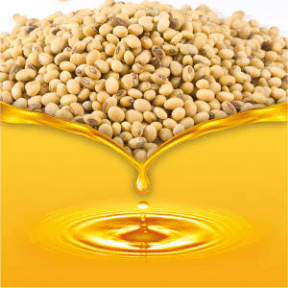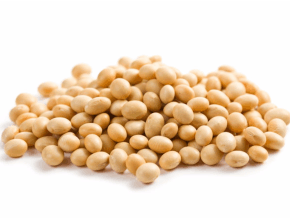What is Soybean Oil?
Soybean oil is a vegetable oil that is extracted from the seeds of soybeans.
It is a popular cooking oil due to its mild flavor, high smoke point, and low cost. Soybean oil is also used in various food products, such as baked goods, snack foods, and dressings.

How do they get the oil out of the plant?
Cleaning and preparation: The soybeans are cleaned to remove any impurities and then heated to soften them.
Extraction: The softened soybeans are then crushed and pressed to remove the oil. The resulting mixture of oil and soybean solids is then treated with a solvent, typically hexane, which helps to extract more oil from the mixture.
Separation: The solvent-oil mixture is then separated from the soybean solids using a centrifuge. The solvent is then evaporated from the oil using heat and vacuum, leaving behind pure soybean oil.
Refining: The crude soybean oil is then further refined to remove any impurities and improve its color, taste, and stability. This process typically involves degumming, neutralization, bleaching, and deodorization.
The resulting soybean oil is a clear, pale-yellow liquid with a mild flavor and high smoke point, making it a popular choice for cooking and food production.



What Industries use Soybean Oil?
Soybean Oil
Industrial Uses- Food industry: Soybean oil is commonly used as a cooking oil and as an ingredient in many food products such as margarine, baked goods, and salad dressings.
- Cosmetics industry: Soybean oil is used in many skincare and cosmetic products due to its emollient and moisturizing properties.
- Industrial applications: Soybean oil is used in industrial applications such as biofuels, lubricants, and plastics.
- Pharmaceutical industry: Soybean oil is used as an excipient in pharmaceutical formulations due to its biocompatibility and stability.
- Animal feed industry: Soybean oil is used as an ingredient in animal feed formulations to provide energy and improve the nutritional value of the feed.
How does Soybean oil work as an active ingredient in plant spray to control pest and fungus?
Suffocation: Soybean oil can help suffocate insects such as mites and aphids by coating their bodies and disrupting their breathing mechanism. This can help prevent them from reproducing and spreading.
Fungal growth inhibition: Soybean oil contains compounds that have antifungal properties, which can help prevent the growth and spread of mold and mildew on plants.
Adhesion: Soybean oil can help improve the adhesion of the spray to the plant surface, which can increase its effectiveness in repelling pests and preventing fungal growth.
Safe for plants: Soybean oil is generally considered safe for plants and does not harm them, which makes it a good alternative to synthetic pesticides and fungicides.
Is Soybean Oil in Minus Bite Trinity?
Yes, Soybean oil is an active ingredient in our all natural plant spray, Trinity.
Benefits of using all-natural plant spray with soybean oil and essential oils.
Environmental friendliness: All-natural plant sprays are less harmful to the environment and wildlife compared to synthetic pesticides and fungicides.
Reduced chemical exposure: Using all-natural plant sprays can reduce chemical exposure for both humans and animals, which can help promote better health and well-being.
Non-toxic: All-natural plant sprays are typically non-toxic and safe for use around children and pets.
Sustainable: Using all-natural plant sprays supports sustainable and eco-friendly agriculture practices, which can help promote long-term environmental health.
Improved plant health: Essential oils in all-natural plant sprays may offer additional benefits to plant health and growth, including improved nutrient uptake and disease resistance.
Timeline of the Usage of
Soybean Oil- 2000 BCE: Soybeans were first cultivated in China, where they were primarily used for food.
- 1400s: Soybeans began to be used for oil production in China, primarily as a cooking oil.
- 1800s: Soybean oil production spread to other parts of Asia, including Japan and Korea.
- 1900s: Soybean oil production began to expand globally, with the United States becoming one of the largest producers.
- 1920s: Soybean oil began to be used in the manufacture of margarine and other food products.
- 1930s: Soybean oil became an important ingredient in the manufacture of soaps, paints, and other industrial products.
- 1950s: Soybean oil began to be used as a diesel fuel substitute in some parts of the world.
- 1980s: Soybean oil began to be used in the production of biodiesel fuel.
- 2000s: Soybean oil continued to be used in a wide range of applications, including food, industrial products, and biofuels. It also gained popularity as an ingredient in skincare and haircare products.
Soybean Oil has a long history of use!
Soybean oil has wonderful qualities such as being a versatile and healthy cooking oil, a natural and environmentally friendly ingredient for skincare products, and a sustainable and renewable source of biofuel.
Soybean oil as a sustainable feedstock for biodiesel production.

Soybean oil can be converted into biodiesel, which is a renewable and sustainable alternative to traditional fossil fuels. The process involves removing glycerin from the oil, which creates a fuel that can be used in diesel engines without modification. Biodiesel made from soybean oil is biodegradable, non-toxic, and emits fewer greenhouse gases compared to petroleum-based diesel fuel. As a result, soybean oil has become an important feedstock for the production of biofuels, which can help reduce dependence on fossil fuels and mitigate the negative impacts of climate change.
Reading Material on Soybean Oil
CRUNCHY SOYBEANS RECIPE

5 Minute Read By Erin Voegele | May 12, 2021

References:
Cooking: Soybean oil’s high smoke point and suitability for high-heat cooking methods are widely recognized by culinary experts and health organizations, such as the American Heart Association. (Source: American Heart Association – Cooking Oils 101) https://www.heart.org/
Heart health: The heart health benefits of soybean oil are supported by numerous studies, including a systematic review and meta-analysis published in the American Journal of Clinical Nutrition. (Source: American Journal of Clinical Nutrition – Soybean oil reduces cholesterol levels) https://ajcn.nutrition.org/
Skin health: The use of soybean oil in skincare products is supported by research, including a study published in the Journal of Drugs in Dermatology. (Source: Journal of Drugs in Dermatology – Soybean oil: A natural ingredient with proven moisturizing efficacy) https://jddonline.com/
Hair health: The use of soybean oil as a hair conditioner is supported by anecdotal evidence and the fact that soybean oil is commonly found in hair care products marketed as natural and organic.
Industrial uses: The use of soybean oil in biodiesel production is well-established and recognized by the United States Environmental Protection Agency. (Source: United States Environmental Protection Agency – Biodiesel production) https://www.epa.gov/
GRAS status: Soybean oil’s GRAS status is recognized by the United States Food and Drug Administration (FDA), which publishes the GRAS List of food ingredients. (Source: United States Food and Drug Administration – Generally Recognized as Safe (GRAS)) https://www.epa.gov/pesticide-registration

